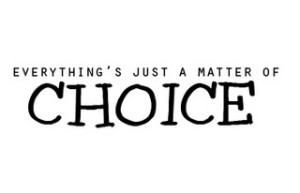School reforms are failing to improve schools universally because standardization of children is not the solution to the systems problems. The “reformers” in control of the message are promoting more and “better” standards while overlooking the fact that the individuality, diversity, and unique character of Americans defies standardization.
But now — are we so tired of hearing the same ole’ education rhetoric that we no longer hear the voices rising up across this country asking to be heard? The voices are those of parents asking for something better, teachers wanting to teach what children need to know, and children asking us to care about what they need. They are all voices crucial to any real reform conversation.
It’s time to take control of that conversation…word-by-word.
“Choice” is one word that clearly strikes at our core values as Americans. But our right to choose is one thing; our care in choosing is quite another.

Choice matters. Consider this; informed choices based on various perspectives are more likely to get to what is right.
We must consider the fact that reform requires a problem be identified and the faulty practice creating the problem be replaced with a better one. For responsible decision-making to occur, It requires our careful analysis. It requires we put aside emotional responses, look at the facts; consider all our choices and the potential consequences of each.
To choose wisely, we must understand that true reform will support, guide, produce, and ensure practices that improve every child’s education.
